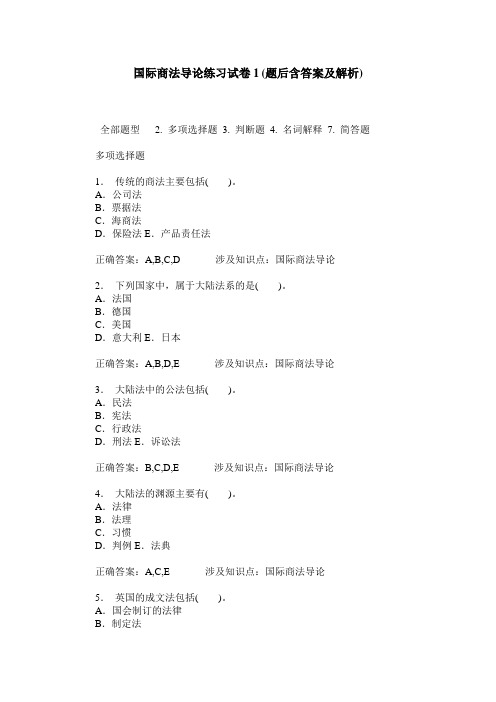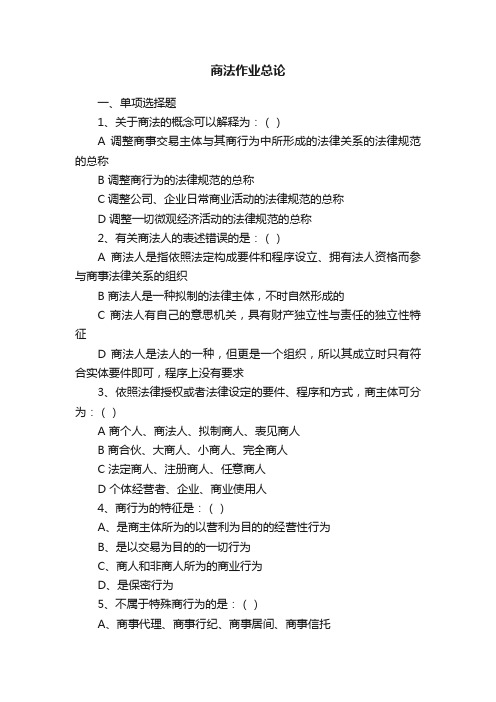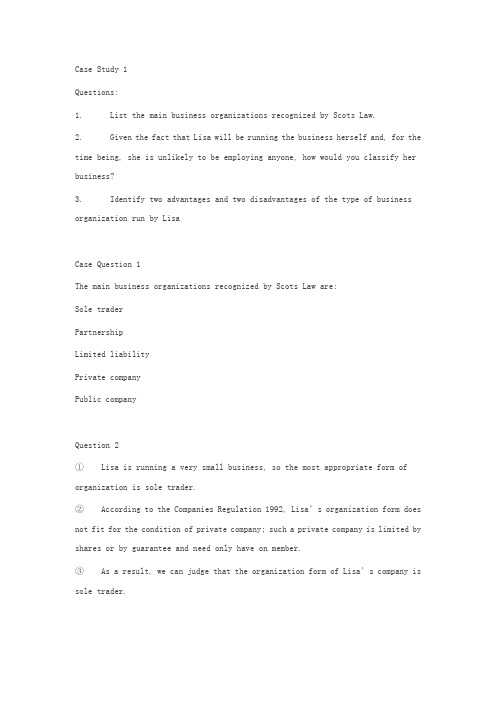商法导论作业
- 格式:doc
- 大小:32.50 KB
- 文档页数:4

商法课后作业参考答案第一套作业一、单项选择题1 B2 A3 C4A5B6 D7 A8 C9C10C二、多项选择题1 ABCDE2 ABD 3ADE 4.ACD 5ABE6 ABCD7 AC 8BDE9ABC10ABE:三、判断题1 x2 x3 x4V5x6 V7 x8 V9x10x四、简答题1.(一)公司章程的时间效力(二)公司章程对公司的效力(三)公司章程对股东的效力(四)公司章程对董事、监事和经理的效力2.(一)证券的发行主体及发行人必须具备一定的资格(二)证券法上的证券发行过程具有程序性(三)同次发行证券同一发行条件五、论述题见王保树主编、朱慈蕴副主编《商法》,当代世界出版社2006 年版(以下称“商)第法” 3 页最后一段至第 4 页末尾。
六、案例题(1)无效。
(2)可以。
第二套作业一、单项选择题1.A 2 .C 3 .D 4.B 5 .D6.C 7 .D 8 . C 9 .B 10 .C二、多项选择题1.ABD 2 .ABCE 3.ABD 4.ABDE 5.ABCDE 6.ABCDE 7.ABCDE 8.ABC 9 .ABCE10 .ACD三、判断题1. x 2 . V 3 . V 4 . x 5 . V6.V 7 . V 8 . V 9 . V 10 . x四、简答题1.1、发起人须符合法定人数。
2、公司的全资本分为等额股份3、股东负有限责任4、资本证券化和公司具有社会性2.意义:证券是指记载并代表一定民事权利的书面凭证。
特征:1、证券是指证券人拥有特定民事权利的书面凭证 2 、证券是能够代表特定民事权利的权利凭证。
3 、证券是一种要式凭证 4 、证券是一种流通凭证五、论述题见《商法》第15页第二段至第16 页。
六、案例题1.刘某为高级管理人员,担任监事违反公司法;2 、孙某身为公务员担任公司经理违法;3 、孙某未经股东会同意当即答应对周某担保违反公司章程,违反忠实义务;4 、孙某未经股东会同意篡夺商业机会并获利归己违反忠实义务。

国际商法导论练习试卷1(题后含答案及解析)全部题型 2. 多项选择题3. 判断题4. 名词解释7. 简答题多项选择题1.传统的商法主要包括( )。
A.公司法B.票据法C.海商法D.保险法E.产品责任法正确答案:A,B,C,D 涉及知识点:国际商法导论2.下列国家中,属于大陆法系的是( )。
A.法国B.德国C.美国D.意大利E.日本正确答案:A,B,D,E 涉及知识点:国际商法导论3.大陆法中的公法包括( )。
A.民法B.宪法C.行政法D.刑法E.诉讼法正确答案:B,C,D,E 涉及知识点:国际商法导论4.大陆法的渊源主要有( )。
A.法律B.法理C.习惯D.判例E.法典正确答案:A,C,E 涉及知识点:国际商法导论5.英国的成文法包括( )。
A.国会制订的法律B.制定法C.行政机关按法律制定的先例D.行政法规E.民法典正确答案:A,B,C,D 涉及知识点:国际商法导论6.美国州法院中属于第一审法院的是( )。
A.州上诉审法院B.州最高法院C.有限管辖法院D.普通管辖法院E.联邦最高法院正确答案:C,D 涉及知识点:国际商法导论7.19世纪上半叶确立起来的“先例约束力的原则”,在( )适用。
A.法国B.德国C.英国D.美国E.日本正确答案:C,D 涉及知识点:国际商法导论8.衡平法是英国法二元性结构的一部分,对衡平法正确的理解为( )。
A.它是判例法B.它不是判例法C.其作用是补充和匡正普通法的不足D.是枢密大臣按照所谓“公平与正义”的原则作出的判例E.衡平法与普通法在法律术语上有较大的差异正确答案:A,C,D,E 涉及知识点:国际商法导论9.各国缔结的有关国际商事和贸易的国际条约或公约是国际商法的重要渊源之一。
它可以分为两个种类,即( )。
A.产品责任适用法律公约B.统一实体法规则的国际公约C.冲突法规则的国际条约D.1978年《国际海上货物运输公约》E.国际贸易惯例正确答案:B,C 涉及知识点:国际商法导论10.国际贸易惯例是国际商法的另一个重要渊源,并在国际贸易中起着十分重要的作用。

商法作业2商法练习题二一、单项选择题1、我国商事登记主管机关是[ ]A.国家税务机关B.国家社团管理机关C.国家工商行政管理机关D.各级人民政府2、下列各项中,不属于我国《企业法人登记管理条例》中规定的登记种类是[ ] A.开业登记B.变更登记C.注销登记D.分公司的设立登记3、下列说法正确的是[ ]A.民族自治地方的企业可以使用本民族自治地方通用的民族语言B.企业名称中不可以使用外文名称C.企业名称中可以使用汉语拼音字母D.在商号中使用“总”字的,必须下设两个以上分支机构4、对上市公司商事帐簿设置的干预,体现了[ ]A.强制原则B.放任原则C.折中原则D.严格原则5、住所地在长春的四海公司在北京设立了一家分公司。
该分公司以自己的名义与北京实达公司签订了一份房屋租赁合同,租赁实达公司的楼房一层,年租金为30万元。
现分公司因拖欠租金而与实达公司发生纠纷。
下列判断哪一个是正确的?[ ]A.房屋租赁合同有效,法律责任由合同的当事人独立承担B.该分公司不具有民事主体资格,又无四海公司的授权,租赁合同无效C.合同有效,依该合同产生的法律责任由四海公司承担D.合同有效,依该合同产生的法律责任由四海公司及其分公司承担连带责任6、下列所作的各种关于公司的分类,哪一种是以公司的信用基础为标准的分类?[ ]A.总公司与分公司B.母公司与子公司C.人合公司与资合公司D.封闭式公司与开放式公司7、符合《公司法》规定的设立公司条件即可依法登记为有限责任公司或者股份有限公司,这体现了公司设立的[]原则。
A.特许主义原则B.准则主义原则C.核准主义原则D.自由主义原则8、股份有限公司的公司章程在公司成立后,对公司股东具有约束力。
但这种约束力不涉及[ ]A.参加过公司创立大会的股东B.公司股东名册上的全体股东C.公司成立后新加入的股东D.已转让全部股份的原公司股东9、某公司为以募集方式设立的股份有限公司,其注册资本额为人民币1000万元,发起人认购股份不得少于[ ]万元。

精品练习第一章导论一、名词解释1. 国际商法;2. 国际贸易惯例;3. 成文法;4.大陆法系;5. 先例约束力原则;6. 英美法系7.法典二、填空题1.国际商法是调整国际商事交易和商事组织的各种关系的法律规范的总和。
2. 国际商法的两个重要渊源是国际法和国内法。
3.目前在国际经济贸易中影响最大的贸易惯例是国际商会制定的《INCOTERMS2010 》和 UCP600 》。
4.大陆法强调成文法的作用,它在结构上强调系统化、条理化、逻辑化和法典化。
5.大陆法系各国把法分为公法和私法两大部分。
6.美国法律分为联邦法和州法两大部分,这是美国法律结构上的一个主要特点。
7.大陆法系分布很广,甚至一些英美法系国家的个别地区也属于大陆法系,如美国的路易斯安那州、加拿大的魁北克省、英国的苏格兰地区。
三、判断题1.在国际商法这一概念中,“国际”的含义是指国家与国家之间的意思。
(X )2.大陆法各国都主张编纂法典,主要有民商合一与民商分立两种编制方法。
( V )3. 国际商法是现代法律体系中一个重要的法律部门或组成部分。
(V)4.德国和法国都民商合一国家。
( X)5.当国际商事条约与国内商事法律发生冲突时应采纳“条约优先适用”原则。
(V )6.国际商法在性质上主要是私法。
(V )7.《美国统一商法典》已被大多数州所采纳。
(V)8. 立法、司法、行政等司法解释是现行中国法律的一个重要渊源。
(V)9.我国《最高人民法院公报》公布的典型案件判决,对同类案件具有法律约束力或指导意义,说明我国是判例法国家之一。
(X)四、单选题1. 判例在法律上和理论上不被认为是法律的渊源的国家是( D )。
A 英国B 美国C 印度D 中国2.大陆法各国都把全部法律分为公法和私法两大部分,这种分类法最早是由( B )法学家提出来的。
A 法国B 罗马C 德国D 荷兰3. 在国际商法中,从事国际商事交易的主体不包括( D )。
A 公司B 个人企业C 合伙D 国家4.英国法的主要特点是(D )。

商法作业总论一、单项选择题1、关于商法的概念可以解释为:()A 调整商事交易主体与其商行为中所形成的法律关系的法律规范的总称B 调整商行为的法律规范的总称C调整公司、企业日常商业活动的法律规范的总称D 调整一切微观经济活动的法律规范的总称2、有关商法人的表述错误的是:()A商法人是指依照法定构成要件和程序设立、拥有法人资格而参与商事法律关系的组织B 商法人是一种拟制的法律主体,不时自然形成的C 商法人有自己的意思机关,具有财产独立性与责任的独立性特征D 商法人是法人的一种,但更是一个组织,所以其成立时只有符合实体要件即可,程序上没有要求3、依照法律授权或者法律设定的要件、程序和方式,商主体可分为:()A 商个人、商法人、拟制商人、表见商人B 商合伙、大商人、小商人、完全商人C 法定商人、注册商人、任意商人D 个体经营者、企业、商业使用人4、商行为的特征是:()A、是商主体所为的以营利为目的的经营性行为B、是以交易为目的的一切行为C、商人和非商人所为的商业行为D、是保密行为5、不属于特殊商行为的是:()A、商事代理、商事行纪、商事居间、商事信托B、商事货运、商合伙、商委托C、融资租赁、商事仓储、商事货运D、商事行纪、商事买卖6、在下列各项中,一般不属于商事登记的限制内容的是:()A、主体的限制B、行为符合法律的一般要求C、行为符合法律规定的具体要求D、商主体住所的限制7、我国商事登记的主管机关是:()A、国家税务机关B、国家社团管理机关C、国家工商行政管理机关D、各级人民政府8、下列各项中,不属于我国《企业法人登记管理条例》中规定的等级种类的是:()A 开业登记B 变更登记C 注销登记D 分公司的设立登记9、不属于商号特征的是:( )A 商号具有保密性B 商号具有区域性限制C 商号具有可转让性D 商号权具有公开性10、商业帐簿设置的目的为()A 消耗性B 交换性C 平等性二、多项选择题1、下列属于商事主体特征的是()A、商事主体由商法法定B、商事主体依法具有商事能力C、商事主体的身份或资格经商业登记而取得D、商事主体以从事营利性活动为常业2、依据商事主体的组织形式,可分为()A、商个人B、商法人C、法定商人D、商合伙3、以下选项中,哪些属于绝对商行为?()A、汇票的出票B、保险行为C、在证券交易所买卖股票D、海商事行为4、下列属于商行为特征的是()A、以营利为目的B、是经营性行为C、是商主体所为的行为D、是经登记的行为5、商事行为以行为人是否均为商主体为标准进行划分,可分为()A、绝对商事行为B、单方商事行为C、相对商事行为D、双方商事行为6、下列属于一般商事行为的是()A 商事代理B商事债权行为C商事买卖D 商事运输7、下列属于商事登记的特征的是()A 创设性B 要式性C 公法性D 自愿性8、在我国,商业名称必须具备的要素包括()A 地名B 字号C 行业或经营特点D 组织形式9、下列属于商事代理的特征的是()B 独立性C 有偿性D 连续性10、下列属于维护公平交易原则体现的是()A 诚实信用原则B 充分尊重当事人意思自治原则C 情事变更原则D 短期时效主义三、判断题1、凡是从事商行为的人都是商人。

Case Study 1Questions:1. List the main business organizations recognized by Scots Law.2. Given the fact that Lisa will be running the business herself and, for the time being, she is unlikely to be employing anyone, how would you classify her business?3. Identify two advantages and two disadvantages of the type of business organization run by LisaCase Question 1The main business organizations recognized by Scots Law are:Sole traderPartnershipLimited liabilityPrivate companyPublic companyQuestion 2① Lisa is running a very small business, so the most appropriate form of organization is sole trader.② According to the Companies Regulation 1992, Lisa’s organization form does not fit for the condition of private company; such a private company is limited by shares or by guarantee and need only have on member.③ As a result, we can judge that the organization form of Lisa’s company is sole trader.Question 3Advantages:① very basic legal requirements to comply with② Total control over his/her business and does not have to take into account the opinions of any shareholders.③ It is the simplest form of business organization recognized by Scots Law④ A sole trader is to all intents and purposes to be regarded as a self-employed person.Disadvantages:① A sole trader may find it difficult to fund an expansion of the business because she/he can not offer shares to other parties in order to raise funds.(筹集资金) ② If the business fail, the sole trader is said t o have unlimited liability for any debts or obligations owed to third parties.③ The inclusion of new partners would force a change in the nature of business, operation by converting it into a partnership or some other form of corporate body.④ (in a ny case), A business expansion requiring a major injection of capital might entail a loss of control over the business because new members who are a source of new finance will almost certainly demand a say in the running of the business. 以上优、缺点各选两个答即可Case Study 2Question 1What are the main differences between a traditional partnership and a limited liability partnership (LLP)?PartnershipUnincorporated bodyPartners have unlimited liability in respect of partnership debtsNo need to be registered with registrar of companies and no need to supply formal documentsRegulated by Partnership Act 1890LLPCorporate bodyMembers enjoy limited liability in respect of LLP debtsMust be registered with the registrar of companies and certain documents must be suppliedRegulated by LLP Act 2000Question 2What are the main advantages for an existing partnership when it changes to a limited liability partnership?① The reason why many traditional partnerships try to translate to LLP is that the members can enjoy the limited responsibilities.② Further more, under the conditions of losing of privacy and greatering external regulation for the members, lots of traditional partnerships definitely hope to translate to LLP.(because of LLP…)Question 3What is the nature of the legal relationship between partners in firm and members of a LLP?① There exist a fiduciary relationship in law relationship between company and partners.② 举例说明公司与成员之间的忠实关系 Pillans Brothers v Pillans [1908]③ According to Limited Liability Partnerships Act 2000, section 6 regulations, there should be recognized to an agent’s relationship between members and LLP.④ The general rule of the law agency that an agent (member) must always act in the best interest of his principal (LLP).⑤ A member is not an agent of his fellow members.Case Study 3Question 1What is a company’s objects clause?① Object clause 是存在于Memorandum of Association 之中的。
商法作业1第一章一、正误判断题1.商事关系,大体上说,主要包括两部分,一是商事组织关系,二是商事交易关系。
2.营业商行为,就是以营利为目的并具有营业性质的行为。
3.绝对商学院行为,就是依行为性质,无论什么人实施都构成商行为的行为。
4.所谓商人,就是以自己名义实施商行为,并以此为常业的人。
二、单项选择题1.日本商法第262条设立的“表见代表董事”制度规定,经理、副经理、专职董事、常务董事和其他董事,使用被认为代表公司的名称所为的行为,即使其没有代表董事的权限,公司对善意第三人应承担一该行为的责任。
对此规定在商法理论上如何理解?()A它是严格责任的体现B它贯彻了强化企业组织的原则C它贯彻了维护交易公平的原则D它是外观法则的体现2.商人应具备的基本条件:()A自然人B法人C以他人的名义实施商行为D以实施商行为为常业三、多项选择题1.商会只应具备哪能些基本条件?()A自然人B实施商行为C以自己的名义实施商行为D以实施商行为为常业2.为什么说英美法的商法概念属于实质商法的范畴?()A英美法没有民法与商法的严格区分,也没有相对于民法典意义上的商法典B英美的商法没有确定的形式C英美的商事法律规范来自判例,而不是成文的商事立法D英美的商事法律规范有包括单行法律、判例、民间自治规章等等在内的广泛渊源四、论述题1.是否具备商人资格有什么法律意义?2.在我国取得商人这种特殊主体资格应具备地什么基本的条件?3.具有商人性质的主体主要有几种形式?4.举例说明什么是营业商行为?“营业”须具备的条件是什么?什么是附属商行为。
第2章一、正误判断题1.有限责任公司成立后,发现作为出资的实物、工业产权、非专利技术、土地使用权的实际价额显著低于公司章程所定价额的,应当由交付该出资的股东补交其差额,公司设立时的其他股东对其承担连带责任。
2.有限责任公司股东以外的人转让其出资时,必须经过全体股东过半数同意。
3.有限责任公司经股东同意转让的出资,在同等条件下,其他股东对该出资由优先购买权。
《商法》作业(一)一、名词解释1.商人答:指以一定的自身或社会有形资源或无形资源为工具获取利润并附有一定社会责任的人,或者是指以自己名义实施商业行为并以此为常业的人。
2.商号答:是指商主体在从事商行为时候所使用的名称,即商主体在商事交易中心为法律行为时,用以署名或让他的代理人用其与他人进行商事交往的名称3.股份有限公司答:又称股份公司,是指其全部资本分为等额股份,股东以其所认购的股份为限对公司承担责任,公司以其全部财产对公司债务承担责任的企业法人。
4.有限责任公司答:是指股东以其认缴的出资额为限对公司承担责任,公司以其全部财产对公司债务承担责任的企业法人。
5.无限公司、两合公司答:无限公司就是全体股东对公司债务承担连带无限责任的公司。
两合公司,是以共同商号进行商业活动的公司,其股东的一人或数人以其一定的出资财产数额而对公司的债务负责任,其他股东负无限责任。
6.公众公司、闭锁公司答:公众公司是指向不特定对象公开发行股票,或向特定对象发行股票使股东人数超过200的股份有限公司。
闭锁型公司是指股东人数甚寡,且股权流通性很低的公司。
7.股东答:是指通过向公司出资或者通过受让股权而成为有限责任公司或股份有限公司成员,对公司享有权利、承担义务者。
8.董事答:是指由公司股东会选举产生的具有实际权力和权威的管理公司事务的人员,是公司内部治理的主要力量,对内管理公司事务,对外代表公司进行经济活动。
9.监事答:是股份公司中常设的监察机关的成员,又称“监察人”,监察股份公司业务执行情况。
由监事组成的监督机构称为监事会或监察委员会,是公司必备的法定的监督机关。
10.公司章程答:是指公司所必备的,规定其名称、宗旨、资本、组织机构等对内对外事务的基本法律文件。
11.资本多数决答:又称股份多数决,是指在符合法定人数或表决权数的股东大会上,决议以出席股东大会股东表决权的多数通过才能生效,法律则将股东大会中多数股东的意思视为公司的意思,并对少数派股东产生拘束力。
《商法学》综合练习题第一编商法导论第一章商法概述一、填空题:1、商法,亦称商事法,是调整(商事关系)的法律规范的总称。
2、商主体,是指依照法律规定参与(商事法律)关系,能够以自己的名义从事商行为的人.3、(商事账簿)是指商主体为了表明其财产状况和经营状况而依法制作的簿册。
4、会计凭证,是指记录商主体日常经营活动情况并作为依据的(书面证明)。
二、单选题1、下列不属于商事登记必须的项目(B)。
A、商号B、经营目标C、经济性质D、分支机构2、郭敏霞与杨银成立一快餐公司,拟取名为“重庆市517餐饮有限责任公司”,试问:该商业名称中( A )是违法的。
A 重庆市B 517C 餐饮D 有限责任3、甲公司收购了乙公司的全部资产和营业,并在收购完成后将股本规模扩大一倍,甲公司按规定办理了登记手续。
甲公司的商业登记属于(B)性质。
A 开业登记B 变更登记C 重组登记D 注销登记4、甲公司与乙公司决定以各自的全部资产、人员和营业合并成立一名称为“大岩”的有限责任公司,大岩公司的商业登记属于( A )性质.A设立登记 B 变更登记 C 重组登记 D 注销登记5、书法家郝催欲开办一从事雕刻的个体企业,其所起的下列企业名称中,( D )符合商事法的要求。
A 郝催B 郝催雕刻公司C 郝催之家D 郝催雕刻店6、某工厂职工李卫前将自己的私房加价出售给本厂作专家宿舍,后因该厂经营不善而不能支付价款,双方诉至法院.李卫前与工厂之间是(B).A 双方商事法律关系B 单方商事法律关系C 民事法律关系D 行政法律关系7、石望公司决定将其部分财产和营业分立出去成立一个新公司佳名公司,请问:佳名公司的工商登记属于(B)。
A 变更登记B 设立登记C 换名登记D 改制登记三、多项选择1、商法的基本原则有(ABCD)。
A 促进交易迅捷原则B 强化商事组织原则C 维护交易安全原则D 实现交易公平原则2、商法的特征是什么( A、B、C、D ).A 兼容性B 技术性C 营利性D 国际性3、作为商人必须具备的法律特征包括(A、B、C )A。
商法作业1000字摘要:一、引言1.商法概述2.商法作业的重要性二、商法基本理论1.商法的定义与特点2.商法的基本原则三、商事主体1.企业的法律形态2.商事合伙与企业法律关系四、商事交易1.合同法在商事交易中的应用2.货物买卖合同的订立与履行五、商事纠纷解决机制1.商事仲裁与诉讼2.调解与协商解决商事纠纷六、公司治理与股权转让1.公司治理结构及其运作2.股权转让的法律规定与实践七、商事登记与监管1.商事登记制度概述2.商事监管部门的职责与执法八、商业秘密与知识产权保护1.商业秘密的法律保护2.知识产权在商事活动中的运用与保护九、商事犯罪及其防治1.商事犯罪的类型与特点2.商事犯罪的防范与治理十、结论1.商法作业的总结与回顾2.提升商事法律素养的建议正文:一、引言1.商法是规范商事主体及其活动的一部法律体系。
商法作业则是针对商法学科的学习与实践,旨在帮助学生了解和掌握商事法律制度,提高商事法律素养。
2.商法作业的重要性不言而喻。
随着我国市场经济的不断发展,商事活动日益繁荣,商事法律关系日趋复杂。
了解和掌握商事法律知识,既可以保障自身权益,又可以促进商事交易的顺利进行。
二、商法基本理论1.商法是调整商事主体之间以及商事主体与国家机关之间关系的法律规范。
商法具有以下特点:规范性、实践性、技术性、国际性。
2.商法的基本原则包括:平等原则、自愿原则、公平原则、诚实信用原则。
这些原则为商事主体在商事活动中提供了行为准则。
三、商事主体1.企业的法律形态包括:有限责任公司、股份有限公司、合伙企业、个人独资企业等。
不同类型的企业在法律地位、责任承担等方面存在差异。
2.商事合伙与企业法律关系密切相关。
商事合伙是指两个或多个合伙人按照约定,共同经营商事业务,共享利润和风险。
四、商事交易1.合同法在商事交易中具有重要作用。
合同的订立、履行、变更、解除等环节都需要遵循合同法的规定。
2.货物买卖合同是商事交易中最常见的合同类型。
1.List the main sources of modern Scots Law?The main sources of modern Scots Law are statute law, European Union law and common law.2. (a)What is meant by the doctrine of judicial precedent?(b) Please give an example of a judicial precedent.The doctrine of judicial precedent [stare decisis] involves such a process whereby a judge or judges can develop a rule of law by making a decision in a test case.A test case is the very case in which clarification of an important point of law is sought and judges, after listening to opposing legal arguments, will have to make the decision as to which view of the law is correct. Once this decision has been made, future judges and courts will be expected to follow the reasoning laid down in that test case if they are dealing with a case of similar legal issues.However, it should be stressed that not every judge can make a new, binding legal rule. The authority of the judge or the court will have to be considered first all. It is very unlikely that Junior judges like a Sheriff or a Justice of the Peace will be able to create a new rule of law. On the other hand, if the ruling came from superior courts, for example, the High Court of Justiciary or the House of Lords, this decision would have to be followed by the lower or inferior courts. Therefore, the position of the court matters greatly.Judicial precedent or case law is part of the unwritten law of Scotland.The well known case of Donoghue v Stevenson [1932] could be used as a good example of the doctrine of judicial precedent. (See 5.1.03 P.44)3.(a) Which is the superior legislative body :the Westminster Parliament or the Scottish Parliament?(b) Explain your choice of answer in part above?The superior legislative body is the Westminster (or United Kingdom) Parliament.By the Act of Union in 1707, the previous Scottish Parliament was abolished. Ever since, the new Scottish Parliament is not a completely independent body. It is an inferior body in comparison to the Westminster Parliament, from which the Scottish Parliament derives its authority to pass laws for Scotland.Any legislation of the Scottish Parliament is considered to be secondary legislation NOT primary legislation. Surely a simple Act of the Westminster Parliament is all that it would take to abolish Scotland's Parliament, let alone the legislation by the latter.4. What is a statute?Acts of Parliament are often referred to as legislation or statute law. The Westminster Parliament (the national Parliament of the United Kingdom) alone made laws for Scotland until the creation of the Scottish Parliament, However, Westminster has given the Scottish Parliament authority in many different areas of policy to make statute law.5. Name five Acts of Parliament.You are free to name any five acts of either the Westminster or Scottish Parliaments,e.g. 1) the Health and Safety at Work Act 1974,2) Sale of Goods Act 1979,3) Employment Rights Act 1996,4) Abolition of Feudal Tenure (Scotland) Act 20005) Protection of Children (Scotland) Act 20036) The Licensing (Scotland) Act 19757) The Divorce (Scotland) Act 1976..6. What are the main differences between civil law and criminal law in Scotland? The main differences are:Criminal law is primarily used by the State as a means of maintaining law and order by punishing certain individuals who indulge in such behavior that is regarded as criminal and anti-social. The State uses the criminal law, therefore, to punish criminals on behalf of the community or society as a whole.The civil justice system, in contrast with criminal law, aims to resolve legal disputes between private individuals in the areas as wide-ranging as family law, company law, partnership law, banking and finance law, sale of goods and services, consumer law, personal injury claims, trusts, defamation actions, succession issues and divorce. What courts, standards of proof and procedures should be adopted for a certain case then? It all depends on the nature of the case - whether a criminal action or a civil dispute.7. What is a crime? (You should list four examples of criminal behavior)A crime is behavior which/that is regarded as so blameworthy and which, consequently/finally, threatens or undermines the security of society. Criminal behavior ought to be punished by the state --- e.g. by means of the imposition of a prison sentence and/or fine or other sanction on the person who is convicted of a crime.Murder, rape, assault, fire-raising, theft and fraud are all criminal conducts8. Provide three examples of a civil dispute.Examples of a civil dispute might include any of the following actions:* Employment law disputes e.g. unfair or wrongful dismissal claims, unlawful discrimination and cases involving unauthorized deductions from wages.* Family law disputes (custody or adoption of children).* Divorce or separation actions.* Debt recovery actions.* Defamation of character.* Tenor or authenticity of a lost document.* Land disputes e.g. trespass, nuisance, non-natural use of water, liability for animals, occupier's liability and spiteful use of property rights.* Winding up of a corporate body (companies, limited liability partnerships or limited partnerships) in an insolvency or bankruptcy situation.* Succession disputes (wills).* Trusts.* Personal injury claims.* Contractual disputes whether consumer or commercial in nature.9. (a)In a conflict between Scots and European Union Law, which one of the two legal systems are the Scottish Courts bound to follow?(b) Explain your answer? Such being the case, the Scottish Courts would have to obey the European Union's legal system.The European Union is a club of twenty-seven member states. Like most organizations or clubs, their members, in order to enjoy the benefits of membership, have to obey the rules or laws. UK has been a member of the EU since 1st January 1973 as a result of the passing of the European Communities Act 1972 by the Westminster Parliament. This legislation recognizes the supremacy of European law over domestic law.By the time Britain became a member of the European Union in 1973, many of the EU key laws were already in place and Britain had to accept these as the price of membership of the European Communities (now the Union). So, it would be safe to say that UK national law would never again reign supreme unless Britain decided to withdraw from membership of the European Union.10.(a )What are the four most important institutions of the European Union (b)which of the European Union institutions has law-making powers?(a) The four primary institutions of the European Union are as follows: The Council of Ministers; The European Parliament; The European Court of Justice; The European Commission.(b) Speaking exactly The Council of Ministers, with the advice of the European Parliament, has the power to make laws for the people of Europe. The European Court of Justice enforces European Union Law. The European Commission is effectively the Union's civil service in the sense that it can propose laws (but it cannot actually legislate) and it can also bring breaches of the various European Union Treaties to the attention of the European Court of Justice. In this latter role, the Commission is often regarded as the Guardian of the various European Union Treaties.。